On September 8, Tohoku University hosted the Tri-University Workshop Series’ second workshop, entitled “On Ukraine’s Recovery and Future”. The hybrid event took place at TOKYO ELECTRON House of Creativity on the university’s Katahira campus and drew a total of around 70 in-person and online attendees.
With Russia’s invasion of Ukraine, the situation on the ground remains unpredictable. In light of the discussions within the international community increasingly turning toward Ukraine’s reconstruction, Tohoku University, Sophia University, and Keio University jointly planned and organized this workshop series. Sophia University held the first workshop on June 30, and Keio University will host the third workshop on December 4.
The second workshop opened with remarks from Tohoku University President Hideo Ohno, who highlighted how Japan has drawn upon its experience of the devastation from World War II and repeated natural disasters as well as its expertise from subsequent rebuilding efforts to contribute to disaster prevention and reconstruction on the global stage. He emphasized that the university’s mission lies not only in scientifically capturing and disseminating the experiences and lessons learned from disasters, but also in helping to drive social change and encouraging collaboration amongst international research and academic communities. In this way, as the international community expresses its commitment to Ukraine’s reconstruction, President Ohno described the collaborative efforts of the three affiliated members of the Tri-University Workshop Series as especially meaningful.
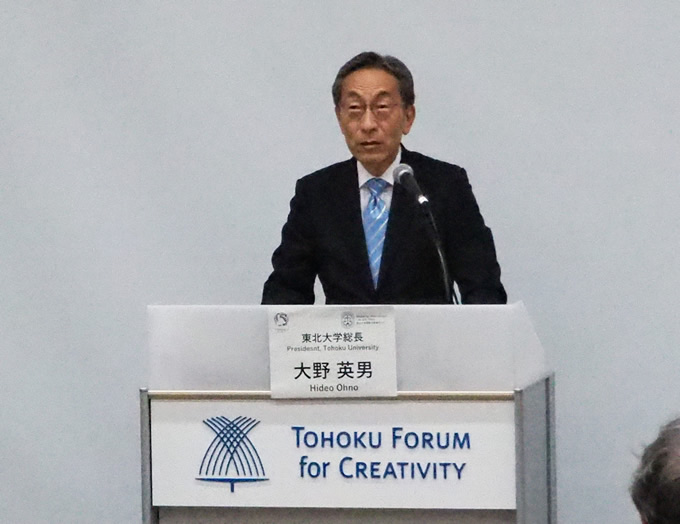
The workshop’s key address was then given by Professor Shinichi Kuriyama, Director of Tohoku University’s International Research Institute of Disaster Science (IRIDeS). He introduced the aims of international disaster-related initiatives as well as the progress made thus far at IRIDeS, which was established by Tohoku University in April 2012 after the Great East Japan Earthquake.
Drawing upon the expertise at IRIDeS and other research institutions, Prof. Kuriyama shared suggestions for possible efforts that could contribute to Ukraine’s reconstruction. In these efforts, he emphasized the necessity of respecting and understanding the affected areas’ local culture, and the importance of securing damaged historical materials and sharing knowledge in order to do so.
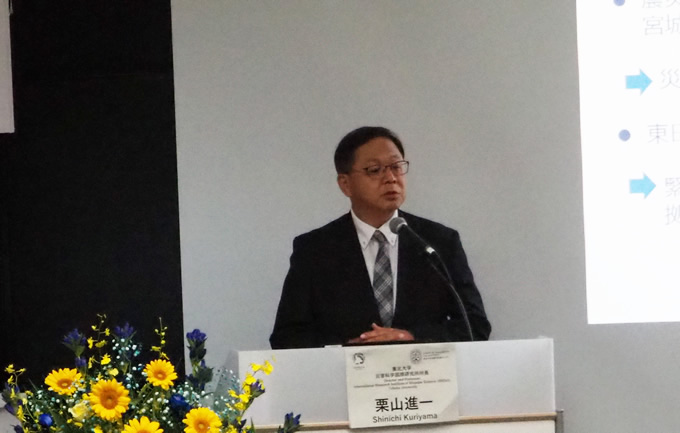
Following the keynote address, six lectures were given by speakers who introduced aspects of the current situation in Ukraine and offered suggestions for reconstruction efforts.
From Keio University’s Faculty of Science and Technology, Professor Toshiharu Ikaga spoke about how expertise from architectural and urban environmental engineering could contribute to Ukraine’s recovery efforts. He pointed out that an individual’s living environment can be a factor that leads to hypertension and cardiovascular diseases, in addition to insulation and appropriate heating systems being closely related to people’s health.
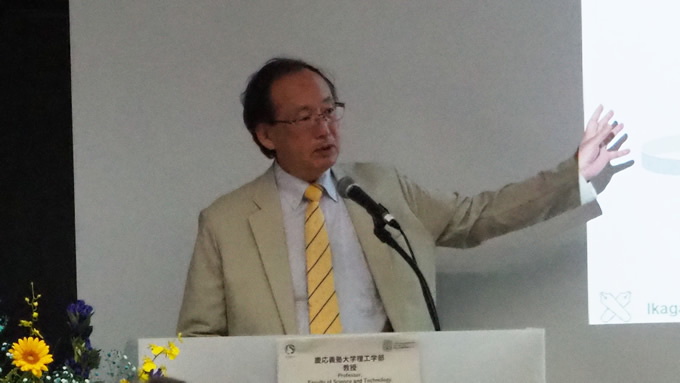
Joining the event remotely from Bosnia and Herzegovina, Professor Taro Komatsu, from Sophia University’s Department of Education and Faculty of Human Sciences, gave a lecture on the possibilities of peacebuilding through education and Japan’s potential contributions. He highlighted several examples of educational support for people affected by disasters.
One such example is a teacher training program that aims to support children’s mental health. It is a project to be carried out through Japan’s Ministry of Foreign Affairs’ Official Development Assistance (ODA) and conducted by a team of clinical psychologists with experience in disaster-response work after natural disasters in Japan. Prof. Komatsu also spoke about the online joint seminars held by Sophia University and the Ukrainian Catholic University, which have supported students’ collaborative online international learning (COIL).
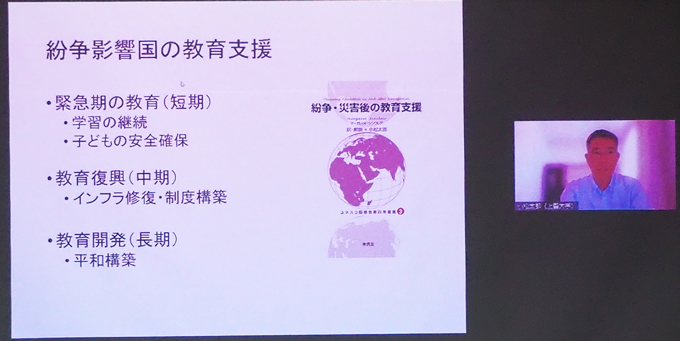
Following this lecture, Specially Appointed Professor Kozo Nagami of Tohoku University’s Green Goals Initiative and IRIDeS discussed how the “Build Back Better” principle to reduce disaster risks and create more resilient nations and societies through the recovery process, could be applied to Ukraine’s rebuilding efforts.
In applying the principle to postwar reconstruction rather than the recovery after a natural disaster, where the emphasis is on reducing and controlling hazard exposure, Prof. Nagami emphasized the absolute necessity of addressing and strengthening the multifaced physical, economic, societal, governmental, environmental, and cultural vulnerabilities in the recovery process. Furthermore, he noted that superficial or temporary reduction of some of these vulnerabilities will not be sufficient. Instead, Prof. Nagami highlighted the importance of identifying the interconnected, causal relationships between such vulnerabilities.
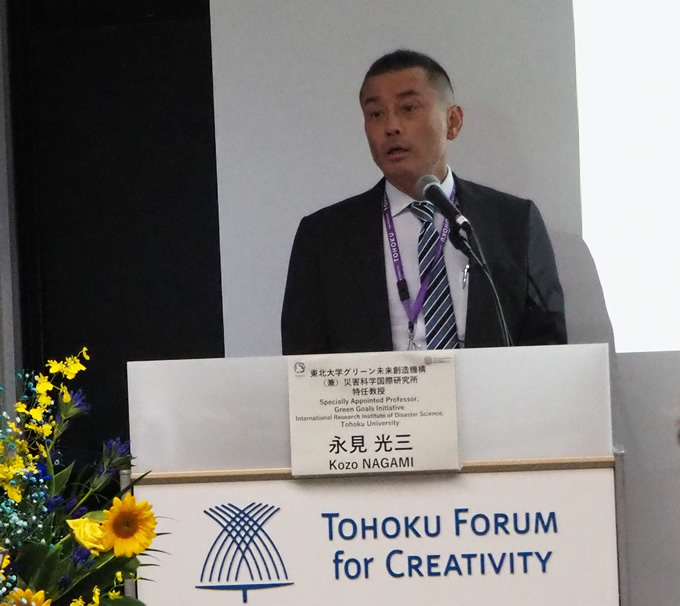
Tohoku University’s Associate Professor Susumu Fujii, from the IRIDeS Disaster Medical Science Division, then presented an analysis of Ukrainians’ use of the social media platform ‘X’, formerly known as Twitter, during Russia’s invasion. He discussed the possibility of analyzing the medical needs and mental health of those in dangerous situations, such as war-torn or disaster-affected areas, where researchers may not be able to collect information on the ground.
Prof. Fujii pointed out the fluctuation in the content of mental health related tweets over time, which, he explained, could suggest similar fluctuations in the mental state of Ukrainians living under wartime conditions. In addition, he discussed future challenges and potential developments, such as the need for long-term support and follow-up to prevent related deaths, and how his findings could be used in the future to grasp the on-the-ground situation in areas affected by unprecedented disasters.
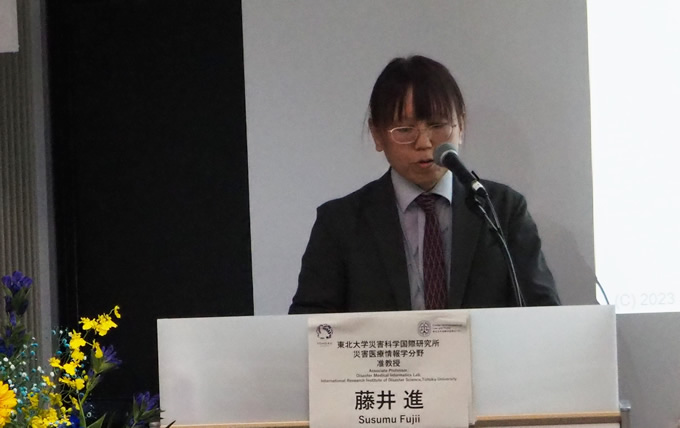
The next lecture was made by Assistant Professor Julia Gerster, a member of the Disaster Culture and Archive Studies branch of the IRIDeS Disaster Humanities and Social Science Division. She spoke about the related “hierarchies of affectedness” experienced by both the Ukrainian people under Russian invasion and the victims of the Great East Japan Earthquake.
Prof. Gerster explained that the differences in damage and loss experienced by individuals in the event of a tragedy can lead to hierarchies of affectedness, in which individuals position themselves according to their own and others’ perceived loss. Such hierarchical positioning can emerge amongst both those who did and did not experience the tragedy, as well as those who were more and less affected by the event. Additionally, she highlighted that hierarchies of affectedness can prevent people from engaging in processing and discussing their loss and experiences, especially when people are afraid of speaking about their trauma because “others might have it worse”. Prof. Gerster then introduced Japanese examples of art projects and performances that incorporated experiences of the Great East Japan Earthquake as a motif. She suggested that these examples could provide ideas for ways in which Ukrainians could talk about their experiences and share them with others.
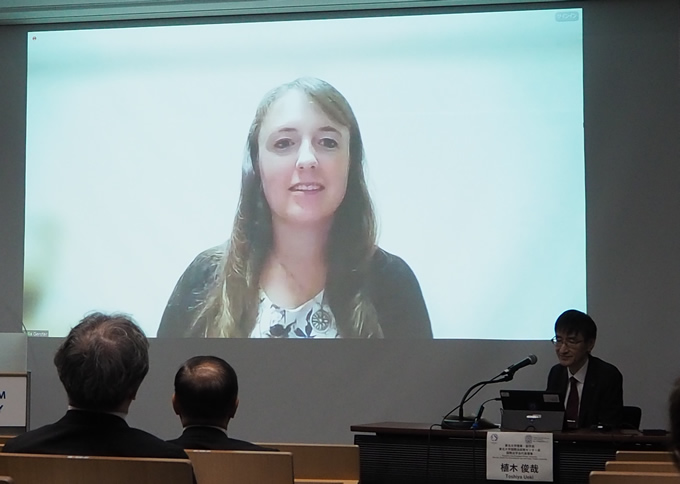
The final lecture was given by Margaryta Goldina, a third-year undergraduate student at the Odessa State Academy of Civil Engineering and Architecture, who is currently a student in Tohoku University’s International Program in Liberal Arts (IPLA). Goldina shared some of her own experiences and discussed how the Russian attacks have completely changed the city where she was born and raised, the people who live there, and her own life.
In the reconstruction process, Goldina explained that the many existing challenges include not only the rebuilding of homes destroyed by missile attacks, but also the clearing of debris, the restoration of cultural assets, and the management of institutional systems necessary to tackle these issues. She also spoke about the importance of Japan’s expertise in disaster recovery to Ukraine’s efforts to rebuild. Goldina concluded her remarks by expressing her deep gratitude for the support Ukraine has received from Tohoku University and the Japanese people.
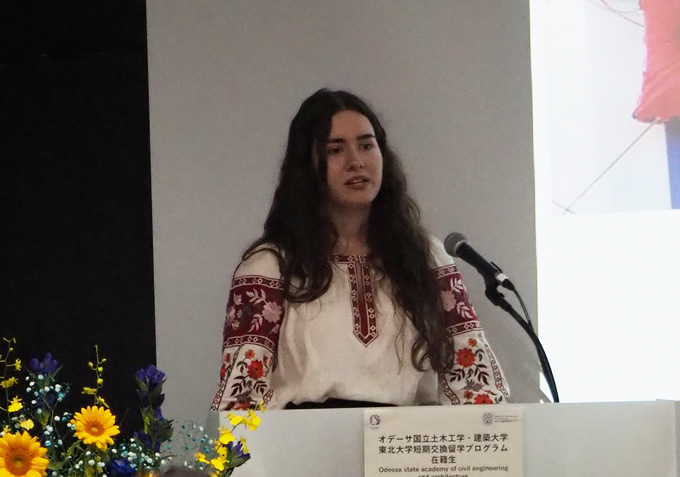
Following the lectures, a video message from the Japanese Ministry of Foreign Affairs’ Mr. Kiyoyuki Sugahara, Director of the Aid Policy and Management Division of the International Cooperation Bureau, was then shared. In his comments, Mr. Sugahara introduced the efforts of the Japanese government and shared his expectations for the workshop, expressing his hope that Japan’s experience of and recovery from devastation after war and natural disasters, such as the Great East Japan Earthquake and tsunami that deeply affected the Tohoku region, could be drawn upon to make important contributions to Ukraine’s recovery.
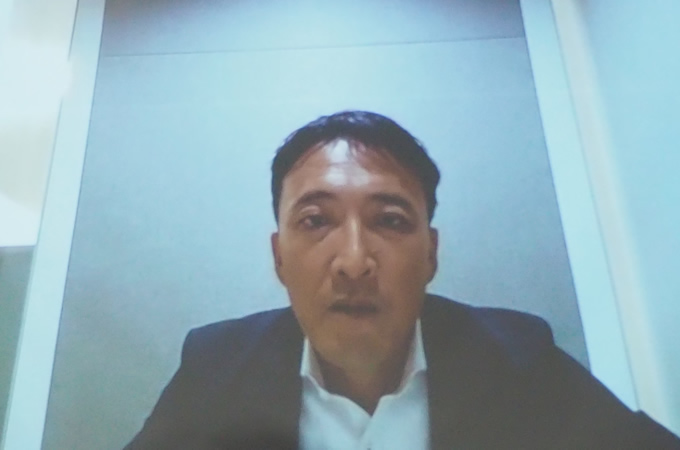
After the lectures and video message, Tohoku University’s Executive Vice President Toshiya Ueki, who also serves as the Director of the Center for International Law and Policy, introduced the humanitarian efforts to remove mines and other unexploded ordnance using ALIS landmine detectors. ALIS, which stands for Advanced Landmine Imaging System, was developed by Tohoku University’s Professor Emeritus Motoyuki Sato , and these detectors are being provided to Ukraine to aid in its reconstruction efforts. Thereafter, EVP Ueki moderated a panel discussion and Q&A session, which further explored the discussions around Ukraine’s reconstruction and brought the successful event to a close.
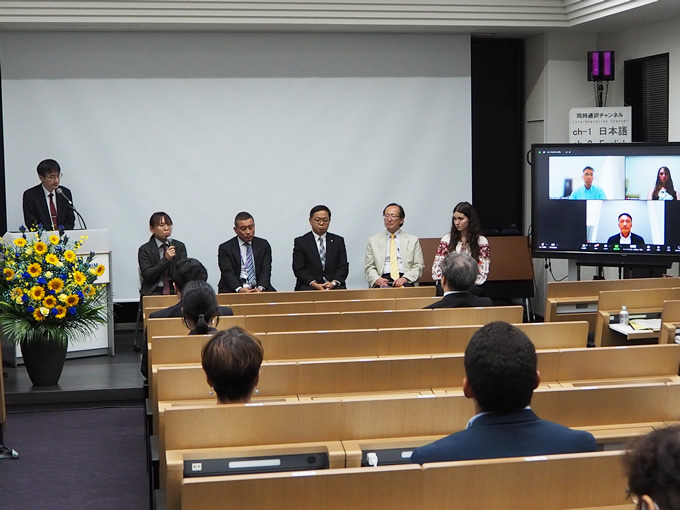
The third and final workshop of the series will be hosted by Keio University and take place on December 4.